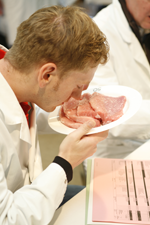Consumer advocate Müller calls for quality seals for meat
Dusseldorf (ots) - The head of the Federation of German Consumer Organizations, Klaus Müller, calls for a graded quality seal for meat products in the supermarket. "I advocate the introduction of a four-stage labeling of meat products, analogous to that of fresh eggs," he told the "Rheinische Post" (Friday edition) published in Düsseldorf ...

 DLG seminar with certificate completion on June 22, 2016 in Frankfurt am Main
DLG seminar with certificate completion on June 22, 2016 in Frankfurt am Main